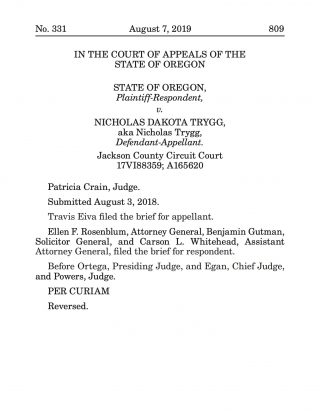
(Photo: J. Maus/BikePortland)
The Oregon Court of Appeals has overturned a lower court decision that found a bicycle rider guilty of passing on the right. The case is a rare interpretation of a bicycle-related statute from this upper court and it strengthens the rights of bicycle riders statewide.

Here’s what happened…
In September 2016, Ashland resident Nicholas Trygg was riding his bicycle in a bike lane as he approached an intersection. A bus operator in the lane to Trygg’s immediate left had passed him and signaled his intention to turn. At the intersection, Trygg continued straight and the bus operator turned across the bicycle lane. The two vehicle operators collided. The bus operator ran over Trygg’s leg and left him with permanent injuries.
Following the collision, an officer from the Ashland Police Department visited Trygg in the hospital and issued him a citation for violating Oregon Revised Statute (ORS) 811.415, “unsafe passing on right.” The bus operator was not cited.
Trygg hired Portland attorney Charley Gee to contest the citation. After losing at trial in Ashland Municipal Court and at the Jackson County Circuit Court, Gee and his client appealed the decision. The Oregon Court of Appeals issued their opinion on August 3rd. Under Presiding Judge Darleen Ortega the Court of Appeals reversed the decisions of the lower courts and conceded that the state made a mistake by citing Trygg.
“The state concedes error,” the Court of Appeals stated in their opinion (PDF).
Here’s an excerpt from the ruling:
At trial, defendant moved for a judgment of acquittal, arguing that he was permitted to pass the bus on the right under ORS 811.415(2)(b). The trial court denied that motion, concluding that defendant could only permissibly pass if it was safe to do so. Defendant appeals, and the state concedes that the trial court erred.
We agree with and accept the state’s concession. Under ORS 811.415(2), passing on the right is permitted “under any of the following circumstances,” one of which is when “the overtaken vehicle is proceeding along a roadway in the left lane of two or more clearly marked lanes allocated exclusively to vehicular traffic moving in the same direction as the overtaking driver.” A marked bicycle lane is a lane of travel for bicycles, ORS 801.155; ORS 814.420, and bicycles are vehicles for purposes of the vehicle code, ORS 814.400(2).
In this case, it is undisputed that defendant was riding in a clearly marked bicycle lane that was located to the right of the lane of travel of the bus and going in the same direction as the bus. Thus, the trial court erred in denying defendant’s motion for judgment of acquittal.
Reversed.
Advertisement
“I hope the government will keep this in mind when they try and apply the laws differently to road users on bikes or people walking. We will be around to challenge them no matter how many times we have to drive across the state and try a case.”
— Charle Gee, lawyer
The odd thing about this case is that the law is relatively clear. Section (2)(c) of ORS 811.415 states, “Overtaking and passing upon the right is permitted if the overtaking vehicle is a bicycle that may safely make the passage under the existing conditions.” Despite that language, the State of Oregon argued against the bicycle rider.
It took a persistent and drawn-out effort from Gee, Eugene-based appellate lawyer Travis Eiva, and his client to prove their case. In an email to me last night, Gee wrote that it was a “long process.”
Here’s more from Gee:
“I tried the defense case twice: once to the Ashland Municipal Court and again to the Jackson County Circuit Court. In both trials the City of Ashland — despite being a League of American Bicyclists Gold Level City and despite the plain language of the law — insisted that the law applied to cyclists differently than to all other road users. And they persuaded a judge. Twice. It was a frustrating endeavor, especially as a trial lawyer.”
Gee says the ruling is important on several levels. While he’s not aware of Portland police issuing citations to bicycle riders for passing other vehicle operators on the right, he said it’s become somewhat common in Ashland and Corvallis. When or if it happens again, Gee says, “Any person cited in these circumstances can point to the Trygg case as precedent (so long as they know it exists).” “More useful though,” he continued, “is that advocates in places like Ashland can use it to educate law enforcement as to what the law is and hopefully prevent future citations.”
Beyond boosting the rights of bicycle riders and being a tool for advocates, Gee thinks the ruling will send a message to police officers and trial court judges. “I hope this shows there is a core group of attorneys here in Oregon that will take these types of cases on despite the costs and time commitments. I hope the government will keep this in mind when they try and apply the laws differently to road users on bikes or people walking. We will be around to challenge them no matter how many times we have to drive across the state and try a case.”
You can read the full opinion here (PDF).
— Jonathan Maus: (503) 706-8804, @jonathan_maus on Twitter and jonathan@bikeportland.org
Never miss a story. Sign-up for the daily BP Headlines email.
BikePortland needs your support.

